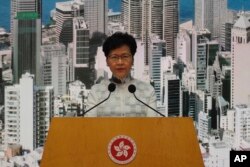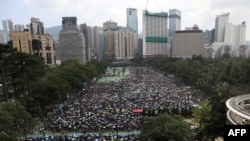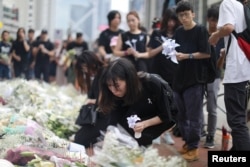Thousands of people took to the streets in Hong Kong on Sunday dressed in black to demand the city’s embattled leader step down, a day after she suspended an extradition bill in a dramatic retreat following the most violent protests in decades.
Activists set up gazebos as protesters, some carrying white flowers, started to gather in sweltering summer heat to march from Victoria Park to Hong Kong’s central government offices.
Beijing-backed Hong Kong Chief Executive Carrie Lam on Saturday indefinitely delayed the extradition bill that could send people to mainland China to face trial, expressing “deep sorrow and regret.”
Significant turnaround
The about-face was one of the most significant political turnarounds by the Hong Kong government since Britain returned the territory to China in 1997, and it threw into question Lam’s ability to continue to lead the city.
“I wasn’t going to come today, but when I saw what happened on Wednesday, Hong Kong people getting wrecked, that really hurt. So I decided to come down,” said Matt Chan who was waiting to join the protest.
Violent clashes Wednesday when police fired rubber bullets and tear gas at protesters near the heart of the financial center grabbed global headlines and forced some banks, including HSBC, to shut branches.
Critics say the planned extradition law could threaten Hong Kong’s rule of law and its international reputation as an Asian financial hub. Some Hong Kong tycoons have started moving personal wealth offshore.
Activist investor David Webb, in a newsletter Sunday, said if Lam was a stock he would recommend shorting her with a target price of zero.
“Call it the Carrie trade. She has irrevocably lost the public’s trust,” Webb said. “Her minders in Beijing, while expressing public support for now, have clearly lined her up for the chop by distancing themselves from the proposal in recent days.”
China’s Communist Party mouthpiece, the People’s Daily, said in a commentary Sunday that central authorities expressed “firm support” for Lam.
Extensive meddling
Protest organizers are hoping more than a million people turn up for Sunday’s rally, scheduled to start at 2:30 p.m. local time, similar to numbers they estimated for a demonstration against the proposed extradition bill last Sunday. Police put that count at 240,000.
The protests have plunged Hong Kong into political crisis, just as months of pro-democracy “Occupy” demonstrations did in 2014, heaping pressure on Lam’s administration and her official backers in Beijing.
The turmoil comes at a difficult time for Beijing, which is grappling with an escalating U.S. trade war, a faltering economy and tensions in the South China Sea.
The city’s independent legal system was guaranteed under laws governing Hong Kong’s return from British to Chinese rule 22 years ago, and is seen by business and diplomatic communities as its strongest remaining asset amid encroachments from Beijing.
Hong Kong has been governed under a “one country, two systems” formula since its return to Beijing, allowing freedoms not enjoyed on mainland China but not a fully democratic vote.
Many accuse Beijing of extensive meddling since then, including obstruction of democratic reforms, interference with elections and of being behind the disappearance of five Hong Kong-based booksellers, starting in 2015, who specialized in works critical of Chinese leaders.
Law and Lam must go
Some opponents of the extradition bill said a suspension was not enough and want it scrapped and Lam to go.
“If she refuses to scrap this controversial bill altogether, it would mean we wouldn’t retreat. She stays on, we stay on,” said pro-democracy lawmaker Claudia Mo.
Asked repeatedly Saturday if she would step down, Lam avoided answering directly and appealed to the public to “give us another chance.” Lam said she had been a civil servant for decades and still had work she wanted to do.
She added that she felt “deep sorrow and regret that the deficiencies in our work and various other factors have stirred up substantial controversies and disputes in society.”
Lam’s reversal was hailed by business groups including the American Chamber of Commerce, which had spoken out strongly against the bill, and overseas governments.
The Hong Kong protests have been the largest in the city since crowds came out against the bloody suppression of pro-democracy demonstrations centered around Beijing’s Tiananmen Square, June 4, 1989.
Officials said 72 people were admitted to hospitals from the Wednesday protest, while a man died Saturday after plunging from construction scaffolding where he unfurled a banner denouncing Hong Kong’s extradition bill, local media reported.
Lam had said the extradition law was necessary to prevent criminals from using Hong Kong as a place to hide and that human rights would be protected by the city’s court, which would decide on the extraditions on a case-by-case basis.
Critics, including leading lawyers and rights groups, note China’s justice system is controlled by the Communist Party, and say it is marked by torture and forced confessions, arbitrary detention and poor access to lawyers.



